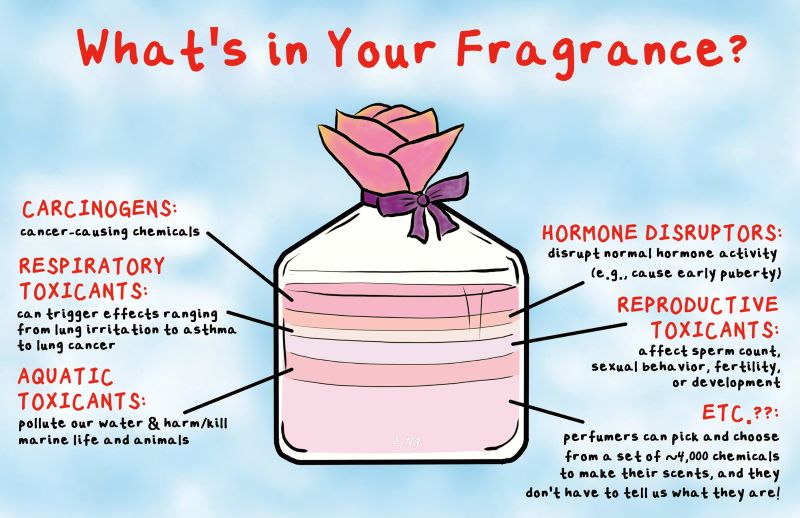Perfumes are made of frangrances that are made of toxic chemicals! There are over 3,000 individual fragrance ingredients used in our favorite perfumes, body lotions, hair products, make-up, and baby products to name a few. While some of these chemicals are safe for our health and the environment, others have never been tested for safety. According to scientists, some of these chemicals are even known to cause cancer, hormone disruption, and reproductive harm!
We use body wash, shampoo, moisturizer, sunscreen, and deodorant every day or even multiple times a day. Over the long-term, your exposure to all these chemicals adds up and can put your health at risk. Many of these chemicals in perfumes are linked to chronic health issues, like cancer, hormone disruption and reproductive harm, or acute health issues like asthma.
What’s in your perfumes?
- Beta-myrcene, a carcinogen and fragrance ingredient found in 3/7 cleaning products and 19/25 personal care products
- Diethyl phthalate (DEP), an endocrine disrupting compound (EDC) found in cleaning and personal care products
- DEHP (Bis(2-ethylhexyl) phthalate), a phthalate banned by the European Union in 2004, found in a personal care product, Summer’s Eve Freshening Spray
- Benzophenone, a carcinogen, and its derivative oxybenzone, found in personal care products
- Propylene glycol, an EDC and reproductive toxicant found in personal care products
- Benzyl salicylate an EDC and fragrance allergen found in personal care products
- Benzaldehyde, an EDC found in personal care products
- Butylated Hydroxytoluene (BHT), an EDC found in personal care products

What is breast cancer?
ALSO READ [EXPLAINER] Hepatitis: causes, symptoms, prevention
Breast cancer is one of the most common cancers in women. But did you know your personal care items might also put you at risk? Read on to know the expert’s opinion on it.
Breast cancer is one of the leading causes of death across the globe. Having proper awareness about it is one of the key factors in checking it and getting it treated well on time. Did you know that your cosmetics and everyday personal care items can put you at risk of breast cancer as well? There are several other toxins in environment that too may risk the development of tumour in women. While genetic predisposition and lifestyle factors are well-established contributors to breast cancer, the role of environmental toxins is increasingly being recognised as a critical factor in the increasing rates of breast cancer according to Dr. Karishma Kirti, Consultant Breast Specialist and Oncoplastic Surgeon. These toxins, which include chemicals found in industrial byproducts, pesticides, plastics, and even some personal care products, have been shown to disrupt hormonal balance, induce DNA damage, and promote cancer development.
How environmental toxins risk breast factor?
Environmental toxins encompass a broad range of chemicals, including endocrine-disrupting chemicals (EDCs), carcinogens, and other toxic substances. EDCs, in particular, are of great concern because they can mimic or interfere with the body’s natural hormones, particularly estrogen. Estrogen plays a key role in the development of breast tissue, and prolonged exposure to estrogen or estrogen-like substances is known to increase breast cancer risk.
One of the most studied environmental toxins is bisphenol A (BPA), a chemical used in the production of plastics and resins. BPA can leach into food and beverages from containers made with this chemical, leading to widespread human exposure. Research has shown that BPA can mimic estrogen and bind to estrogen receptors in breast tissue, potentially leading to increased cell proliferation and cancer development. A study published in Environmental Health Perspectives found that BPA exposure is associated with an increased risk of breast cancer, particularly when exposure occurs during critical periods of development such as puberty.
Pesticides, widely used in agriculture, are another significant source of environmental toxins. Certain pesticides, such as organochlorines, have been classified as possible human carcinogens. These chemicals persist in the environment and accumulate in fatty tissues, including breast tissue. A 2016 study examined the levels of organochlorine pesticides in women with breast cancer and found significantly higher concentrations compared to controls and suggested that these chemicals could be linked to the initiation and progression of breast cancer.
How shampoo, cosmetic products may risk breast cancer?
Phthalates and parabens, commonly used as preservatives in cosmetics and personal care products, are also implicated in breast cancer risk. Both are known EDCs and have been detected in human breast tissue. Phthalates, used in products like shampoos, lotions, and perfumes, have been shown to disrupt the endocrine system and may increase breast cancer risk by altering the expression of genes involved in hormone regulation, Dr. Kirti explained.
Similarly, parabens, used as antimicrobial agents in cosmetics, have been found in breast tumors. A study published by Darbre et al. detected parabens in the breast tissue of women with breast cancer, raising concerns about their role in the disease’s development. While the exact mechanism is still under investigation, the presence of these chemicals in breast tissue suggests that they may contribute to carcinogenesis.
The evidence linking environmental toxins to rising breast cancer rates among women is growing. While more research is needed to fully understand the mechanisms and extent of risk, the existing studies highlight the importance of reducing exposure to these harmful substances.
How to prevent selves from breast cancer
Individuals can take steps to reduce their exposure by choosing products free of harmful chemicals, supporting organic agriculture, and advocating for cleaner air and water.


![[EXLAINER] Your shampoo, perfumes can put you at risk of breast cancer](https://ashenewsdaily.com/wp-content/uploads/2024/08/Perfume.jpg)